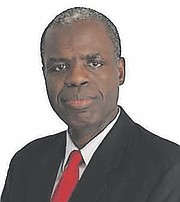By NEIL HARTNELL
Tribune Business Editor
nhartnell@tribunemedia.net
The Bahamas’ high per capita income and well-developed banking industry hides “very uneven access” to financial services, the Central Bank’s governor said yesterday.
John Rolle, pictured, addressing two workshops held in this nation by the Alliance for Financial Inclusion (AFI), of which The Bahamas is a member, said the commercial bank withdrawal from sparsely-populated Family Islands and the continued pressure on correspondent banking relationships were two threats to local access to financial services.
He added that The Bahamas’ own experience showed how “headline”, broad-based economic indicators could obscure the on-ground social and economic realities - including the different levels of access to financial services on different islands across the archipelago.
“On a per capita basis, The Bahamas has the third highest GDP in the Western Hemisphere. Our financial sector is highly developed, when considered in terms of the size of the deposit base and outstanding credit of the domestic banking system, relative to GDP, and in terms of the share of the population that has access to basic banking services,” Mr Rolle said.
“Moreover, relative to the size of the population we enjoy the 35th highest density of bank branches in the world and the 15th highest density of automated banking machines in the world. From an identity perspective, members of the population do not have extreme difficulties acquiring birth certificates or primary documentation needed to apply for identity documents.
“But financial access is very uneven,” he continued. “On many of our rural island communities basic banking services are not available, or only available in very constrained conditions. The rising costs of providing banking through traditional physical channels have further scaled-back this access.
“Also, high concentrations of undocumented immigrants are excluded from access to financial services, even when these services are available in the same spaces for documented persons.”
The Central Bank governor added that developments at the global level were “equally problematic” for Bahamian access to financial services, pointing to some banks’ loss of their correspondent relationships with foreign institutions due to the perceived high risk involved.
“There has been a dilution of access from the disproportionate application of global anti-money laundering and counter financing of terrorism standards on low-risk, retail segments of our financial community. We are now attempting to reverse this through more proportionate risk-based systems,” Mr Rolle said.
“Beyond banking, affordability of access is more constrained in property insurance markets, where financial vulnerability is heightened because of the increasing frequency and intensity of hurricanes, which can in a single season push households into ruin.”
He added: “As it should be, political pressures to address financial inclusion deficits are mounting in The Bahamas, and there has to be comprehensive constructive responses. In the strategies that the Bahamian Central Bank is formulating, we understand that the private sector will not optimally achieve all of the outcomes that we desire.
“We recognise that an enabling environment that embraces the aspirations of the Maya Declaration, with a focus on Fintech, to promote digital inclusion is critical... We have to identify those elements of both the policy space and technology infrastructure that ought to be supplied by the public sector.
“For example, the Central Bank of The Bahamas is engaged in the creation and promotion of a digital version of the national currency which is expected to close vital payments system gaps for The Bahamas that many countries are able to leave up to the private sector to resolve,” Mr Rolle continued.
“At the same time, the Bank has volunteered to coordinate development of a national financial inclusion strategy that would enlist all relevant stakeholders, and focus on more than just payments and banking.”





Comments
bogart 6 years, 10 months ago
See Tribune 18 May 2018 Near 50% Bahamians 'cannot make ends meet'....according Central Bank.....in article...Plus in another article Bahamas banks over past decade lost some 1,000 jobs.....plus 200 billion exited..last 6 an half years ending 2018.... Plus....Guardian article 22 March........Recent Latin America Caribbean Financial Report 2019 pointing Bahamas second largest difference economic.an social between rich.after one odder country....YEP....YEP....YEP.....third largest per capita income GDP...western hemisphere.....YEP....seems after the increased regressive VAT to 12%...half nation people rolling in bout $32,000. pa each....!!!!....people cant even buy up all 50% discounts on govt...land an discounted houses....we pore people on longer charity soup lines feelin so much prosperous wid all dis per capita 3rd wealthiest money in back pocket collecting soup... waiting for da Bentley...Maybach...THANX Gov dese years for making we pore people better...at gettin further....porer...celebratin......hailing ya new planned...builing...in ya ego new skyscraper office.....!!!!!
Sign in to comment
OpenID